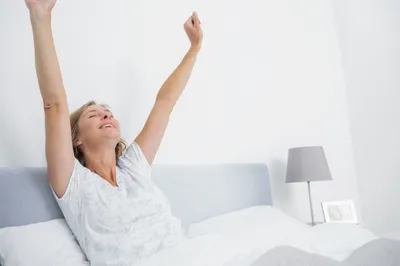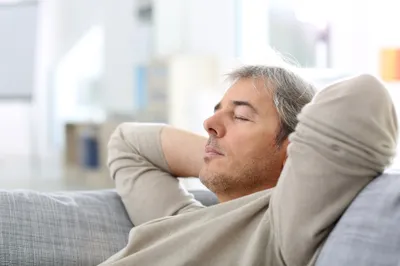Roughly 70 million Americans are kept up at night by a sleep issue—including adequate sleep duration, napping, as well as many misconceptions over what constitutes or affects a good night’s sleep.
Put a stop to the eight most common sleep myths that are keeping you up at night…
1. Sleeping Pills For Long-Term Use
Experts at the National Institutes of Health National Center caution the use of sleeping pills (i.e., Ambien) for long-term use. Prescription sleep medications are meant to break the cycle of chronic sleeplessness for those with sleep disorders (i.e., insomnia). They’re meant to reset sleep patterns by teaching the body to fall asleep and stay asleep. Taking them over the long term can cause dangerous side effects—such as drug dependence, migraines, dizziness, and anxiety. If you need a longer-term solution, experts recommend drug-free sleep therapies like cognitive-behavioral therapy (or CBT).
Myth 2: Six Hours Sleep is Adequate to Function
According to sleep specialists at Emory University, fewer than 1-percent of the world’s population can function well on less than 6 hours of sleep each night. So even though you may have convinced yourself that you only need 6-hours of zzzz’s per night, you’re actually fooling yourself—unless you have the rare genetic mutation that allows you to function on less sleep. If not, you’re in for a wake up call and do require 7 to 8 hours to remain an alert and healthy member of society.
Myth 3: Exercise Keeps Me Up at Night
Researchers at the University of Pennsylvania’s School of Behavioral Sleep Medicine call foul to the idea that physical exertion before bedtime messes with sleep patterns. In fact, many busy folks (including myself) squeeze in a workout and then go straight to bed without issues. Disrupted sleep is no excuse to skip a workout altogether, but if you find your heart still racing at bedtime, move your workout to earlier in the day.
Myth 4: Battle Insomnia with an Earlier Bedtime
The worst thing you can do, if you’re suffering from insomnia, is force an earlier bedtime on yourself, says researchers at Oxford University. True insomniacs suffer with a messed up sleep homeostat, the chemically induced switch in the brain that prompts drowsiness. Trouble nodding off can be fixed by triggering your sleep homeostat’s desire for zzzz’s by letting it kick in naturally vs. the Band-Aid effect of a nap or earlier bedtime. You can activate your inner sleep system by relaxing and reading, drinking herbal tea, or by having a warm bath right before bedtime to lower stress, relax muscles and mind, and bring on natural sleep.
Myth 5: There’s No Such Thing As a Sleep Hangover
Sleep experts at Johns Hopkins Sleep Disorders Center do recognize a condition known as “sleep drunkenness,” a condition that affects approximately 1 in 15 Americans, and causes confusional arousal (waking up confused, unaware of one’s surroundings, and can result in self injury or harm to others). A sleep hangover is common with long naps, which is why experts recommend brief 20-minute naps (no longer) on the couch or in a comfortable chair rather then in your bed so as not to confuse naps with bedtime.
Myth 6: Sleep Less = Get More Done
If you’re energy starts to lull in the afternoon hours, scientists at Stanford University claim that your circadian rhythms are indicating sleep deprivation or (sleep debt) with those feelings of extreme fatigue come mid-afternoon. Cheating yourself from a full night’s sleep throughout the might seem to give you more hours during the day to work with, however the sleep debt will cause red, burning eyes; moodiness, and an inevitable dash to the vending machine not to mention a collection of chronic health conditions (i.e., type 2 diabetes, high blood pressure, and an array of sleep issues). Skimping on mere 90-minutes of sleep per night can impair your daytime alertness and function by more than 30-percent.
Myth 7: Night Owl
Illinois-based sleep clinic, North Shore Sleep Medicine, indicates that night owl behavior triples the risk of depression. Study findings showed that hitting the hay late resulted in mood disorders and poor health, even when night owls got the same amount of winks (hours of sleep) compared to their so-called “early bird” counterparts. Experts point to an optimal window for sleeping and waking within the 24-hour clock. You can gradually curb your night owl tendencies by going to bed 15-minutes earlier every 2 to 3 days and by turning down the lights a few hours prior to your new bedtime.
Myth 8: Naps Make Me Sleepier
A brief 20-minute nap will boost the mood, attentiveness, and performance of most people, claim sleep researchers at Canada’s Brock University. However, if that nappy nap lasts longer than 20-minutes the brain falls into a very deep phase of sleep known as slow-wave sleep, which will indeed cause disorientation and grogginess vs. invigoration after a nap. Therefore, a proper nap should be taken early in the day (i.e., before 4pm) and only last 20-minutes so it doesn’t interfere with your regular bedtime.











